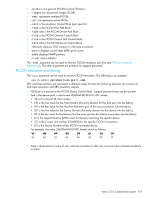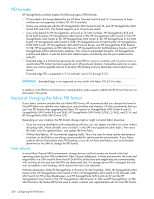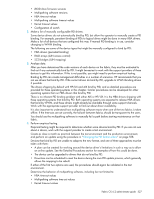HP StorageWorks 8/8 HP StorageWorks Fabric OS 6.2 administrator guide (5697-00 - Page 528
PID formats, Impact of changing the fabric PID format
 |
View all HP StorageWorks 8/8 manuals
Add to My Manuals
Save this manual to your list of manuals |
Page 528 highlights
PID formats HP StorageWorks switches employ the following types of PID formats: • VC encoded is the format defined by the HP Fibre Channel Switch 8 and 16. Connections to these switches are not supported in Fabric OS 4.0.0 and later. • Native was introduced with the HP StorageWorks SAN Switch 8 and 16, and HP StorageWorks SAN Switch 8-EL and 16-EL. This format supports up to 16 ports per switch. • Core is the default for HP StorageWorks 4/8 and 4/16 SAN Switches, HP StorageWorks 8/8 and 8/24 SAN Switches, HP StorageWorks SAN Switch 2/8V, HP StorageWorks SAN Switch 2/16V, HP StorageWorks SAN Switch 2/32, HP StorageWorks SAN Switch 4/32, HP StorageWorks 4/64 SAN Switch, HP StorageWorks SAN Switch 4/32B, HP StorageWorks 8/40 SAN Switch, HP StorageWorks 8/80 SAN Switch, HP StorageWorks 400 Multi-Protocol Router, and HP StorageWorks SAN Director 2/128, HP StorageWorks 4/256 SAN Director, HP StorageWorks DC SAN Backbone Director, and HP StorageWorks DC04 SAN Director platforms. This is the recommended format for HP StorageWorks switches and fabrics. It uses the entire 8-bit address space and directly uses the port number as the area_ID. • Extended edge is a format that generates the same PID for a port on switches with 16 ports or less as would native PID format, but also supports up to 256 ports per domain. It should be used only in cases where you cannot upgrade devices to dynamic PID binding and you absolutely cannot reboot your servers. Extended edge PID is supported in 3.1.2 and later and 4.2.0 through 5.3.0. IMPORTANT: Extended Edge is not supported on any switch with Fabric OS 6.0.0 or later. In addition to the PID formats listed here, interoperability mode supports additional PID formats that are not discussed in this guide. Impact of changing the fabric PID format If your fabric contains switches that use Native PID format, HP recommends that you change the format to Core PID before you add the new, higher port count switches and directors. HP also recommends that you use Core PID format when upgrading the Fabric OS version on StorageWorks SAN Switch 8 and 16, StorageWorks SAN Switch 8-EL and 16-EL, HP StorageWorks SAN Switch 2/8-EL, 2/16-EL, and 2/16, and HP StorageWorks MSA SAN Switch 2/8. Depending on your situation, the PID format change might or might not entail fabric downtime: • If you are running dual-fabrics with multipathing software, you can update one fabric at a time without disrupting traffic. Move all traffic onto one fabric in the SAN and update the other fabric. Then move the traffic onto the updated fabric, and update the final fabric. • Without dual fabrics, HP recommends stopping traffic. This is the case for many routine maintenance situations, so dual fabrics are always recommended for uptime-sensitive environments. If your fabric contains devices that employ static PID binding, or you do not have dual fabrics, you must schedule downtime for the SAN to change the PID format. Host reboots In some Fibre Channel SAN environments, storage devices and host servers are bound to the host operating system by their PIDs (called their Fibre Channel addresses). In these environments, the hosts and target HBAs in a SAN need to know the full 24-bit PIDs of the hosts and targets they are communicating with, but they do not care how the PIDs are determined. But, if a storage device PID is changed, the host must re-establish a new binding, which requires the host to be rebooted. With the introduction of the HP StorageWorks 4/8 and 4/16 SAN Switches, 3016, HP StorageWorks SAN Switch 2/8V, HP StorageWorks SAN Switch 2/16V, HP StorageWorks SAN Switch 2/32, Brocade 4Gb SAN Switch for HP p-Class BladeSystem, and HP StorageWorks SAN Switch 4/32 and the HP StorageWorks Core Switch 2/64, HP StorageWorks SAN Director 2/128, and HP StorageWorks 4/256 SAN Directors, the Native PID format used in earlier switches was supplemented with the Core PID format, 524 Configuring the PID format















